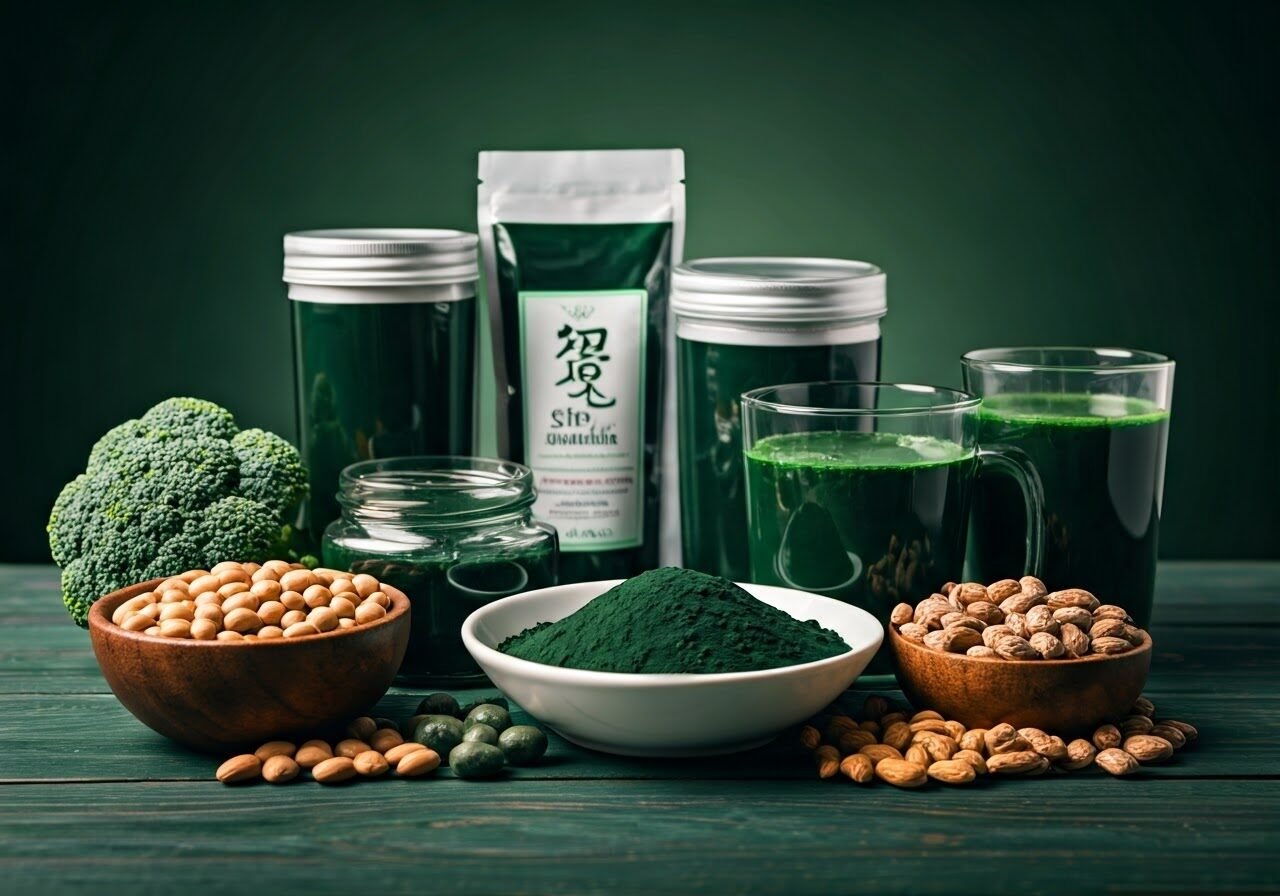
Unveiling Spirulina: Superfood Algae Overview
In the superfood world, spirulina is a standout. This blue-green algae, called Arthrospira platensis, is a rich source of nutrition and may offer health benefits. You can find spirulina as a dietary supplement in both powder and tablet forms. It’s easy to add to smoothies, meals, or take alone.
Spirulina has been eaten since ancient times. It gained new attention when NASA looked into it as a food source for space missions. Its high nutrient value and low environmental impact make it great for long space trips. However, spirulina is not just for astronauts. It is still being studied for its potential in helping with different health issues. This makes it an interesting topic for scientists and health fans.
What Is Spirulina (Arthrospira platensis) and Where Does It Come From?
Spirulina, known scientifically as Arthrospira platensis, is a tiny blue-green algae. It grows in alkaline waters, such as lakes and ponds. This single-celled organism gets its bright color from substances called chlorophyll and phycocyanin. Phycocyanin is a strong antioxidant that offers many of spirulina’s health benefits.
Historical records show that ancient people, like the Aztecs in central America, ate spirulina. They harvested it from Lake Texcoco in Mexico, dried it into cakes, and used it as food.
Today, spirulina is grown worldwide in controlled locations. This process keeps it pure and high-quality, making it easy to find as a dietary supplement. Many people can now enjoy its possible health benefits.
Spirulina Nutrition Facts: Protein, Vitamins & Minerals
Spirulina is known as a superfood because it is full of nutrients. This tiny power player is a rich source of plant-based protein. It’s a great choice for vegetarians and vegans who want to increase their protein. In fact, just one tablespoon of dried spirulina powder has nearly 4 grams of protein!
But that’s not all it offers. Spirulina has lots of essential nutrients. It provides various B vitamins, like B1, B2, and B3, and essential minerals such as iron, magnesium, and potassium, which help our overall well-being. Plus, it has vitamin E, which is a strong antioxidant.
Spirulina also includes helpful fatty acids, like gamma-linolenic acid (GLA). This omega-6 fatty acid is known for its anti-inflammatory benefits. Together, these nutrients highlight how spirulina can support many functions in our bodies.
To better visualize its impressive nutritional profile, here’s a summary of key nutrients found in a standard serving (e.g., 1 tablespoon or approximately 7 grams) of dried spirulina powder:
| Nutrient | Approximate Amount per 7g | Key Role / Significance |
|---|---|---|
| Potassium | ~95 mg | Blood pressure regulation, nerve signaling |
| Sodium | ~73 mg | Fluid balance, nerve function |
| GLA (Gamma-linolenic acid) | ~70–80 mg | Anti-inflammatory omega-6 fatty acid |
| Chlorophyll | ~45 mg | Antioxidant, supports detoxification |
| Magnesium | ~14 mg | Muscle & nerve function, energy production |
| Protein | ~4 grams | Complete protein, all essential amino acids |
| Phycocyanin | ~1 gram | Potent antioxidant, anti-inflammatory |
| Beta-Carotene (Provitamin A) | ~2–3 mg | Antioxidant, vision support |
| Iron | ~2 mg (varies) | Oxygen transport, energy production |
| Vitamin B3 (Niacin) | ~0.9 mg | Energy metabolism, skin health |
| Vitamin E | ~0.5 mg | Antioxidant, skin protection |
| Copper | ~0.4 mg | Iron absorption, enzyme function |
| Vitamin B2 (Riboflavin) | ~0.25 mg | Energy production, cellular function |
| Zinc | ~0.2 mg | Immune support, tissue repair |
| Vitamin B1 (Thiamine) | ~0.17 mg | Energy metabolism, nerve function |
| Calcium | ~8 mg | Bone health, muscle contraction |
Note: Exact nutrient values may vary depending on the brand and source. These figures are estimates provided for illustrative purposes.
Spirulina Health Benefits: Immunity, Heart, Detox & More
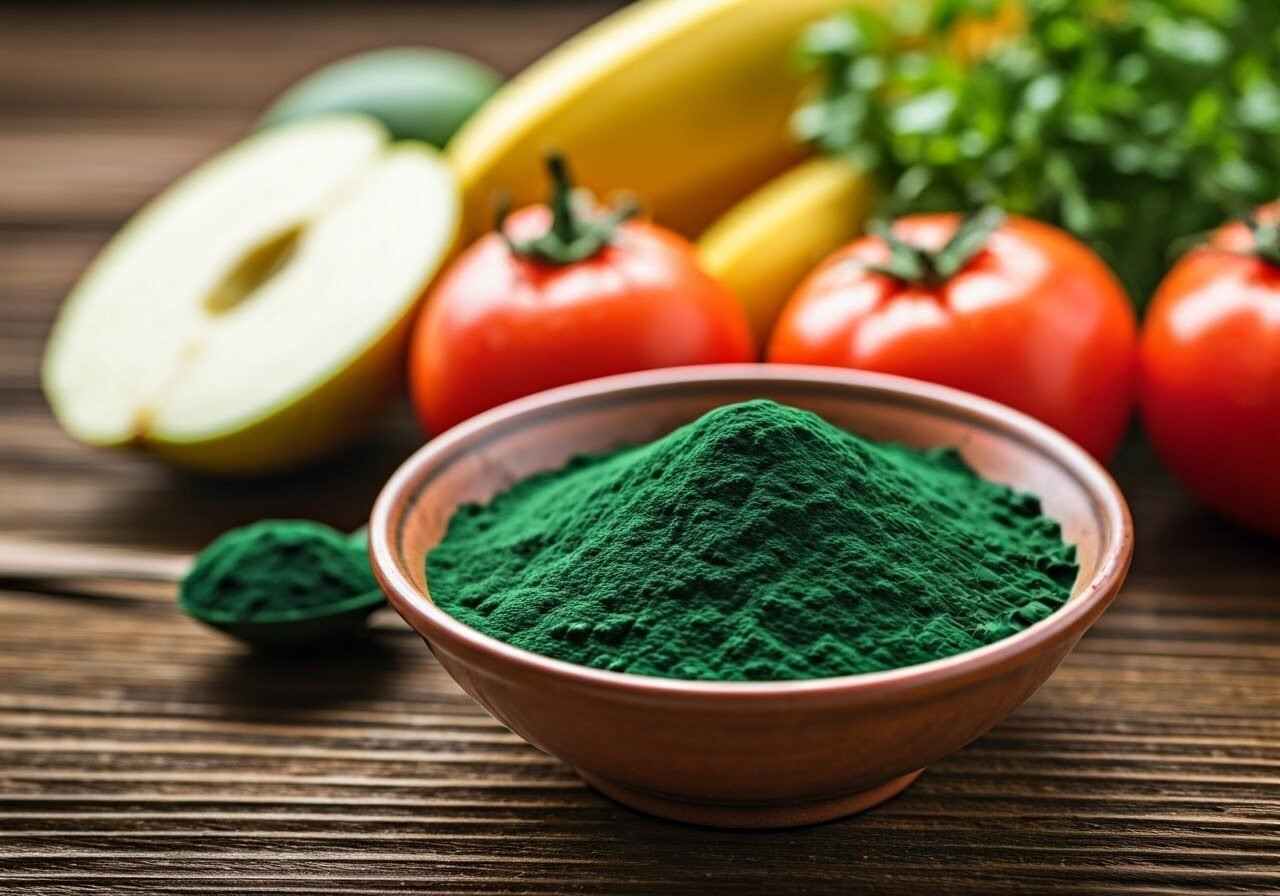
Research is still happening, but spirulina has many possible health benefits. It could help strengthen the immune system and even support a longer life. People can add it to a healthy diet or take it as a supplement. This blue-green algae shows promise in many health areas.
Spirulina can boost the immune system and support detoxification. It may also help heart health and improve athletic performance. Its versatility is impressive. Let’s look at some important areas where this green algae could make a big difference in our health.
How Spirulina Supports the Immune System
A strong immune system is important for protecting our body from harmful germs. Research shows that taking spirulina powder regularly may help improve our natural defenses. This superfood provides our body with a mix of antioxidants and other helpful compounds that reduce oxidative stress and inflammation.
Oxidative stress happens a lot in our modern lives. It can harm the immune system. Spirulina may help by fighting free radicals, which are harmful molecules that come from oxidative stress. This could lead to a stronger and more balanced immune response.
Studies on the effects of spirulina suggest it may boost immunity. But we need more research, especially on humans, to understand how it works and to find the best dosage.
Spirulina for Detox: Heavy Metal Chelation & Cleansing
In today’s world, our bodies face many toxins. These come from things like environmental pollution and processed foods. Because of this, detoxification is very important. It is the body’s way of getting rid of harmful substances. Spirulina may help in this process, as it acts like a natural chelator for heavy metals.
Heavy metals, such as mercury, lead, and arsenic, can build up in the body. This can cause different health problems. Spirulina might help remove these toxins. This can prevent possible liver damage and support overall health.
However, it is key to remember that while some studies show spirulina could be a natural detoxifier, more research is needed. We need to confirm these results and learn more about the long-term effects of using it for detoxification.
Spirulina for Eye Health & Oral Care
The search for good health includes all parts of our well-being, like eye and oral health. New studies show that spirulina, with its rich nutrients, could help in both areas. For eye health, spirulina has zeaxanthin. This is an antioxidant that helps support the health of the macula. Keeping our eyes healthy is important as we get older because our vision can get worse.
But spirulina could help in oral health too. Some research hints that its antimicrobial properties could fight the bacteria that cause oral cancer. While we need more studies to confirm this, the early results suggest that spirulina might help keep our gums and teeth healthy.
Spirulina for Blood Sugar Control & Diabetes Support
Maintaining healthy blood sugar levels is very important for staying well, especially for people with diabetes. Research about spirulina and how it may help manage blood sugar has shown some interesting results. More studies are needed to confirm these findings. However, some studies suggest that spirulina supplementation could help regulate blood sugar levels.
Spirulina should not replace regular diabetes management methods. Still, its possible effects on blood sugar make it an interesting topic for diabetes research. People with diabetes should talk to their healthcare provider before adding spirulina to their diet. This is because they might need to adjust their diabetes medications.
Spirulina for Anemia Relief & Brain Health
Anemia happens when there are not enough red blood cells in the body. This can cause tiredness, weakness, and other health issues. Spirulina is a plant that has a lot of iron. People are looking into how spirulina may help manage anemia. It may help restore iron levels and boost red blood cell production. This might ease symptoms of anemia and help people feel better overall.
Furthermore, spirulina may also be good for brain health. It is rich in antioxidants and may help reduce inflammation. Some studies suggest that eating spirulina regularly could improve brain function, help with memory loss as we age, and support a positive mood. More studies are needed to learn more about these possible benefits.
Spirulina for Weight Loss, Appetite Control & Fitness
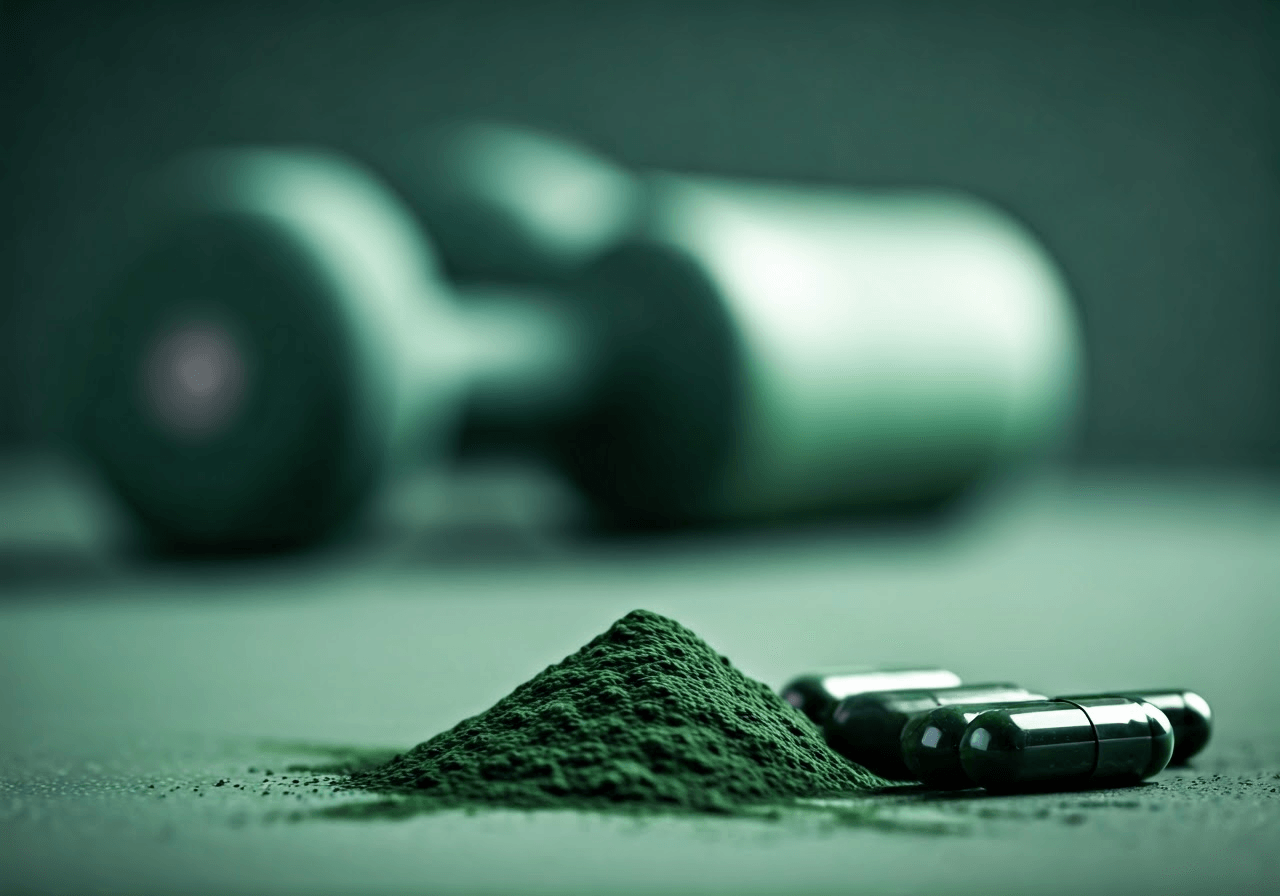
For people looking to maintain a healthy weight, spirulina could be a helpful friend. New research shows that this nutrient-rich algae may help with weight management by affecting how we feel hunger and how our body uses energy.
Also, athletes and fitness fans are starting to use spirulina in their diets. They believe it can improve their workout performance. This is because spirulina is high in antioxidants, which help reduce stress and inflammation from exercise. As a result, it can lead to quicker recovery and better stamina.
How Spirulina Supports Weight Loss: Appetite & Metabolism
Weight management is a journey with many parts, and spirulina can be interesting for people looking for natural support. It has a lot of nutrients and is low in calories, making it a good choice for a healthy weight loss plan. Spirulina can help people feel full and cut down on cravings, which may make it easier to control calorie intake.
One way spirulina is thought to help with weight loss is by affecting hormones that control appetite. It can increase feelings of fullness, leading to eating less food. Some studies also suggest that spirulina may help boost metabolism. This can lead to using stored fat for energy, which helps in fat reduction.
Here’s how spirulina might help with weight loss:
Enhances satiety, reducing overall calorie intake.
Boosts metabolism, promoting calorie expenditure.
Supports healthy blood sugar levels, preventing cravings and overeating.
May aid in reducing body weight and body fat.
Table: Spirulina vs Other Supplements for Weight Management
| Supplement | Main Function | Pros | Cons | Use Cases |
|---|---|---|---|---|
| Spirulina | Appetite control, supports metabolism | Natural, nutrient-dense, high in protein, vegan-friendly | Modest weight loss effects; requires consistent daily use | Appetite reduction, nutrient support for dieting |
| Glucomannan | Satiety, delays gastric emptying | Clinically proven to support fullness, few calories | May cause bloating or GI discomfort; needs water to avoid choking | Reducing hunger, supporting calorie control |
| Green Tea Extract | Slight metabolism boost, fat oxidation | Antioxidant-rich, contains EGCG, mild fat-burning effect, well-studied | Contains caffeine, may cause jitters or insomnia | Metabolism support, pre-workout energy |
| CLA | Fat reduction, body composition | Some evidence for fat mass reduction, easy to find supplement | Mixed research results; may impact insulin sensitivity | Body recomposition, weight management |
| Garcinia Cambogia | Appetite suppression | Popular, plant-based, may help curb cravings | Conflicting research, may cause digestive issues | Short-term appetite suppression, diet support |
| Berberine | Blood sugar & metabolism support | Strong evidence for supporting healthy blood sugar; some weight loss | May cause GI discomfort; interacts with some medications; not for pregnancy | Metabolic health, weight loss for insulin resistance |
Spirulina for Athletes: Endurance, Recovery & Performance
Spirulina is becoming popular in the sports world. It is known as a strong source of nutrition and may help improve athletic performance. It fights oxidative stress and reduces inflammation. These issues can slow down muscle recovery. Because of this, athletes may feel less muscle soreness, recover quicker, and have better endurance. This means they can train harder and get back to it more efficiently.
Moreover, the antioxidant properties of spirulina help protect against skeletal muscle damage. This damage often happens due to intense workouts. By reducing cell damage and helping with repair, spirulina might help keep muscles working well and avoid setbacks in training.
Research on the effects of spirulina shows good signs. It may help improve endurance, muscle strength, and overall performance in athletes.
Table: Spirulina vs Common Athletic Performance Supplements
| Supplement | Primary Benefit | Pros | Cons | Best Use Cases |
|---|---|---|---|---|
| Spirulina | Endurance, muscle recovery | Natural, antioxidant-rich, supports immunity & inflammation | Less direct muscle-building impact than protein or creatine | General stamina, recovery, inflammation |
| Creatine Monohydrate | Strength, explosive power | Strong evidence, increases ATP production, supports lean mass | May cause water retention (in some); not ideal for pure endurance | Short bursts, weightlifting, sprint performance |
| BCAAs | Muscle recovery, reduced soreness | Supports recovery, reduces fatigue, useful during fasted training | Limited effectiveness if total protein intake is adequate | Intra-workout recovery, endurance events |
| Beta-Alanine | Reduces muscular fatigue | Enhances high-intensity performance, buffers lactic acid | Tingling sensation (paresthesia); may require loading phase | HIIT, CrossFit, short intense workouts |
| Beetroot Powder | Endurance, oxygen utilization | Natural nitric oxide booster, may enhance VO2 max | Effects may vary; taste is strong for some | Cardio endurance, running, cycling |
Spirulina for Heart Health: Cholesterol & Blood Pressure
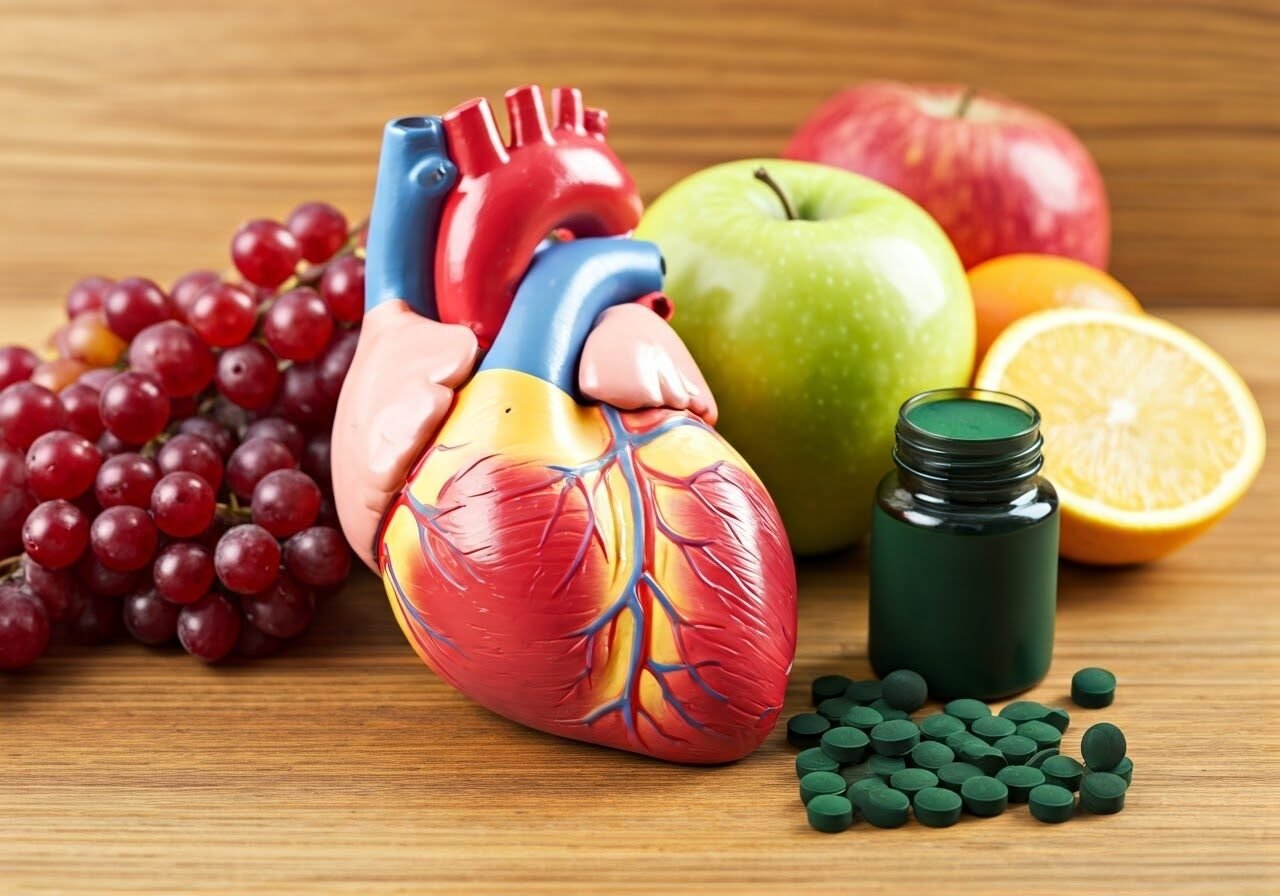
A healthy heart is very important for our well-being. Spirulina can be a helpful friend in keeping our heart healthy. It helps by improving different risk factors for heart disease. This includes keeping blood pressure normal, improving cholesterol levels, and reducing inflammation.
New research shows that adding spirulina to your diet might help your heart work better. But, remember, spirulina should support other healthy habits. Doing things like exercising regularly and eating a balanced diet is still very important.
Does Spirulina Lower Cholesterol? Benefits for Heart Health
High cholesterol raises the risk of heart disease. It’s important to find natural ways to manage cholesterol levels. That’s where spirulina can help. Research shows that spirulina supplementation may lower total cholesterol levels and increase the “good” cholesterol (HDL cholesterol).
The cholesterol-lowering effects of spirulina come from its special mix of nutrients and antioxidants. By lowering “bad” cholesterol (LDL cholesterol), spirulina might help stop plaque from building up in the arteries. This could reduce the risk of heart disease.
While these results are promising, more research is needed. Large-scale clinical trials could confirm these benefits and help determine the right dosages for cholesterol management.
Spirulina for Blood Pressure: Natural Support for Hypertension
High blood pressure, or hypertension, quietly affects millions of people. It’s important to manage blood pressure through changes in lifestyle and medication when needed. This helps to reduce the risks linked to this condition. Some studies suggest that eating spirulina regularly might help keep blood pressure healthy.
We don’t completely understand how spirulina lowers blood pressure. It likely increases the production of nitric oxide. This molecule helps relax and widen blood vessels. As a result, it may lower both systolic and diastolic blood pressure.
While this is encouraging, it’s crucial to remember that spirulina should not replace any medications given for high blood pressure. People with hypertension should talk to their healthcare provider before adding spirulina to their diet.
Table: Comparison of Spirulina’s Impact on Cholesterol vs Blood Pressure
| Health Benefit | How Spirulina Helps | Supporting Compounds / Mechanisms | Research Evidence |
|---|---|---|---|
| Cholesterol Management | May reduce total cholesterol, LDL, and triglycerides, while increasing HDL (“good” cholesterol). | Antioxidants (phycocyanin), GLA, polysaccharides | Several small clinical trials and meta-analyses; more research needed |
| Blood Pressure Regulation | May help lower systolic and diastolic blood pressure by improving blood vessel relaxation. | Increases nitric oxide (NO), antioxidant effects | Preliminary human trials (small sample size); supported by animal studies |
Spirulina for Skin Health & Anti-Aging Benefits
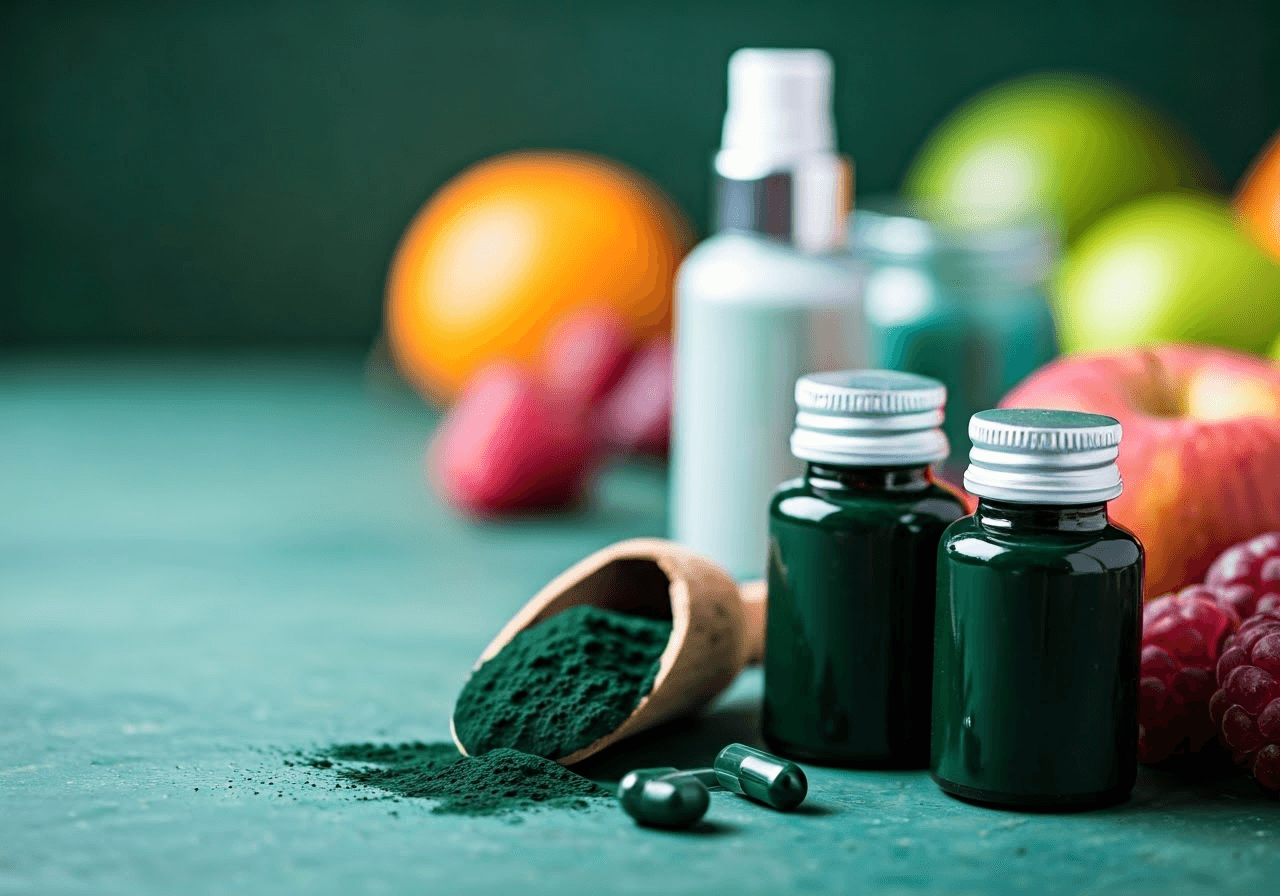
The search for young skin and a lively life is something many people want. Genetics matter, but how we live our lives, especially what we eat, greatly affects how we get older. Spirulina can help us look and feel younger. It is full of antioxidants which help fight oxidative stress. This stress is an important reason why we age too soon.
Spirulina is also good for our skin. It helps fight free radicals, which can harm us from things like pollution. This help makes our skin look young and bright. Let’s find out how this green superfood might be the key to healthy aging and glowing skin.
Spirulina: Antioxidants & Fighting Oxidative Stres
Oxidative stress happens when there is an imbalance between free radicals and our body’s ability to fight them off. This stress is a major cause of many health issues that come with age. Chronic inflammation, often caused by oxidative stress, speeds up aging. It can damage tissue and hurt how our cells work.
Here comes spirulina, packed with antioxidants. These good compounds help neutralize free radicals and lower oxidative stress. By protecting against the damage from free radicals, spirulina might help slow down aging and boost overall health.
Additionally, spirulina has anti-inflammatory benefits. It helps fight chronic inflammation in the body. By reducing inflammation, spirulina might help guard against diseases that come with age and support a longer life.
Spirulina for Glowing Skin: Collagen & Inflammation
Our skin is the biggest organ we have. It is always exposed to bad things in the environment that can speed up aging. Spirulina is a great natural option with many nutrients. It helps fight these effects and encourages skin to look healthy and bright. Spirulina is a rich source of antioxidants, which help protect against damage from UV rays, pollution, and other harmful substances.
What makes spirulina special for skincare is how it can tackle different skin issues. It has anti-inflammatory properties that may calm irritated skin. It can also help with collagen production, which might reduce fine lines and wrinkles, giving a younger look.
Though we need more studies to fully know its benefits for the skin, adding spirulina to your diet or skincare routine can be a good way to achieve and keep healthy, glowing skin.
Table: Spirulina vs Popular Anti-Aging Superfoods
| Superfood | Key Antioxidants | Anti-Aging Mechanisms | Skin Benefits | Ease of Use |
|---|---|---|---|---|
| Spirulina | Phycocyanin, Beta-carotene, Vitamin E | Fights oxidative stress, supports collagen, reduces inflammation | Brightens skin, may reduce wrinkles, calms irritation | Easy to add to smoothies or capsules |
| Blueberries | Anthocyanins, Vitamin C | Neutralizes free radicals, supports skin repair | Improves elasticity, helps protect against UV damage | Eaten fresh or added to oatmeal/snacks |
| Avocado | Vitamin E, Lutein | Moisturizes skin, protects against oxidative stress | Nourishes dry skin, may reduce inflammation | Eaten raw, in spreads or salads |
| Turmeric (Curcumin) | Curcumin | Strong anti-inflammatory, antioxidant, supports skin healing | May reduce acne and skin redness | Best in warm drinks or capsules |
| Green Tea | EGCG, Catechins | Protects skin from UV damage, reduces inflammation | May help tone, reduce puffiness, support anti-photoaging | Drink as tea or use as extract |
Is Spirulina Safe? Side Effects, Precautions & Interactions
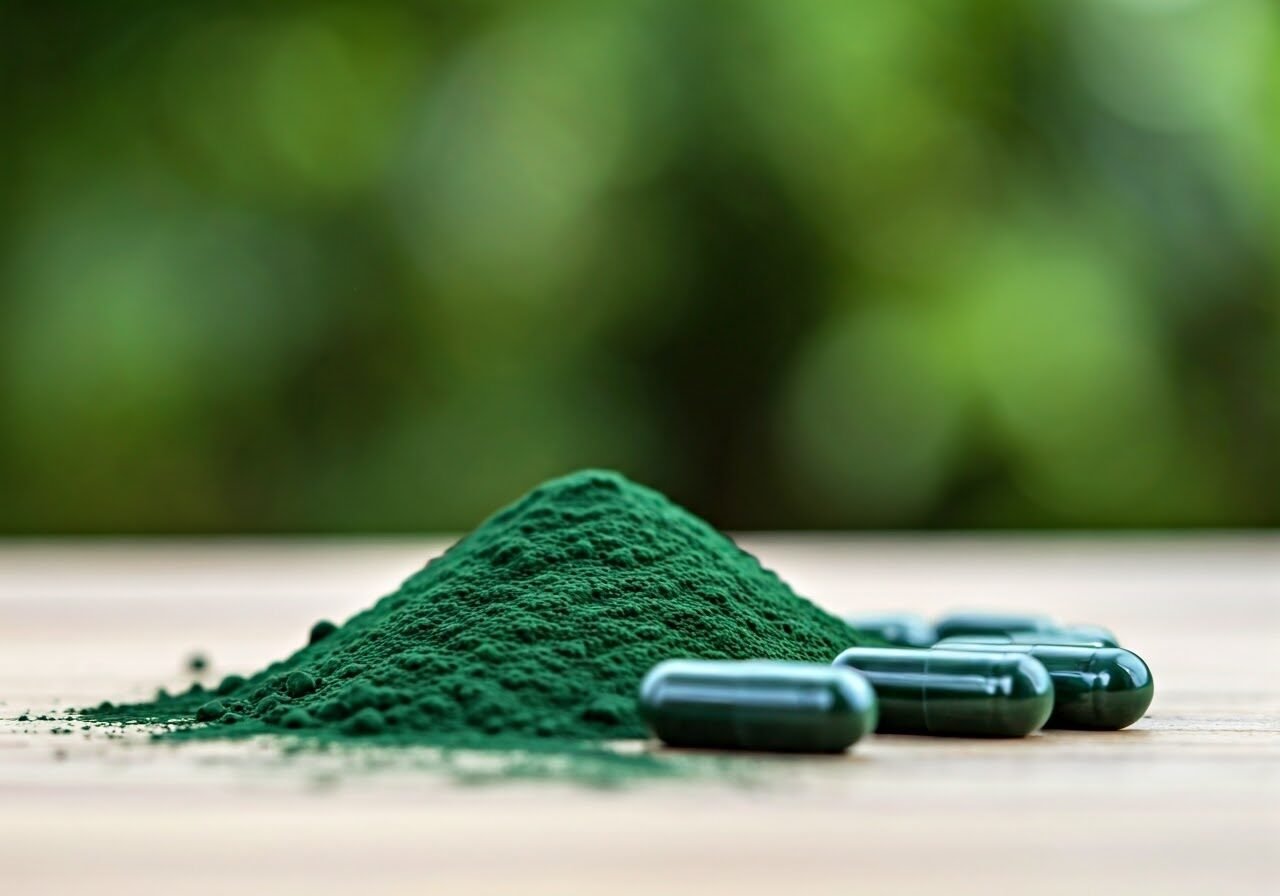
Spirulina is usually safe to eat, but there are some things to keep in mind, just like with any other supplement. Some people might have mild side effects when they first start taking spirulina. These can include upset stomach, headaches, or even allergies.
If you have certain health issues, like autoimmune diseases, it is important to be cautious. You should talk to your doctor before using spirulina. Also, make sure you buy your spirulina from a trusted source. This will help ensure it is high quality and pure.
Spirulina Side Effects: What You Need to Know
Spirulina is usually safe to take, but some people may have side effects. These effects are often mild and go away as your body gets used to it. Some common side effects are stomach issues like nausea, diarrhea, or cramps.
In rare cases, some people could have allergic reactions to spirulina. These can include mild skin rashes, itching, or more serious symptoms like allergic rhinitis. If you experience any negative reactions, it’s important to stop using it and talk to a doctor.
Start with a small dose of spirulina and slowly increase it if you feel okay. Also, make sure to drink enough water while taking spirulina, as it can help detoxify your body.
Table: Comparison of Spirulina Safety Across Different Health Conditions
| Condition | Risk Level | Recommendation | Why It Matters |
|---|---|---|---|
| General Healthy Adults | Low | Safe for daily use in moderate amounts | Rich in nutrients; well-tolerated, few side effects reported |
| Pregnancy / Breastfeeding | Moderate | Consult a healthcare provider before use | Lack of safety studies in these groups; unknown risks to fetus/infant |
| Autoimmune Diseases | High | Avoid unless approved by a physician | May stimulate the immune system and worsen autoimmune conditions |
| Phenylketonuria (PKU) | High | Avoid completely | Contains phenylalanine; unsafe for people with PKU |
| Liver or Kidney Disease | Moderate | Use only under medical supervision | Spirulina is metabolized in these organs; may cause additional stress |
| Blood Thinner Medication | Moderate | Consult a doctor before use | May have mild blood-thinning effects and interact with anticoagulant medications |
| Children / Adolescents | Moderate | Use only under medical supervision | Safety and appropriate dosing not established in children |
| Allergy-Prone Individuals | Moderate | Start with a very low dose; monitor closely | Rare but possible allergic reactions, including rash or difficulty breathing |
Who Should Avoid Spirulina? Warnings & Contraindications
Spirulina has many possible benefits, but some people should stay away from it because of health issues or possible drug interactions. For example, those with autoimmune diseases like lupus or rheumatoid arthritis should talk to their doctor before using spirulina. It could boost the immune system and make symptoms worse.
Also, people with phenylketonuria (PKU), a rare genetic condition, need to avoid spirulina since it has phenylalanine. It’s very important to let your doctor know about all the medications and supplements you are taking, including spirulina, to keep away from any drug interactions.
Keep in mind that spirulina should never replace any prescribed medications. Always check with your healthcare provider before changing your diet or starting new supplements.
How to Take Spirulina: Dosage, Powders, Tablets & Smoothie Recipes
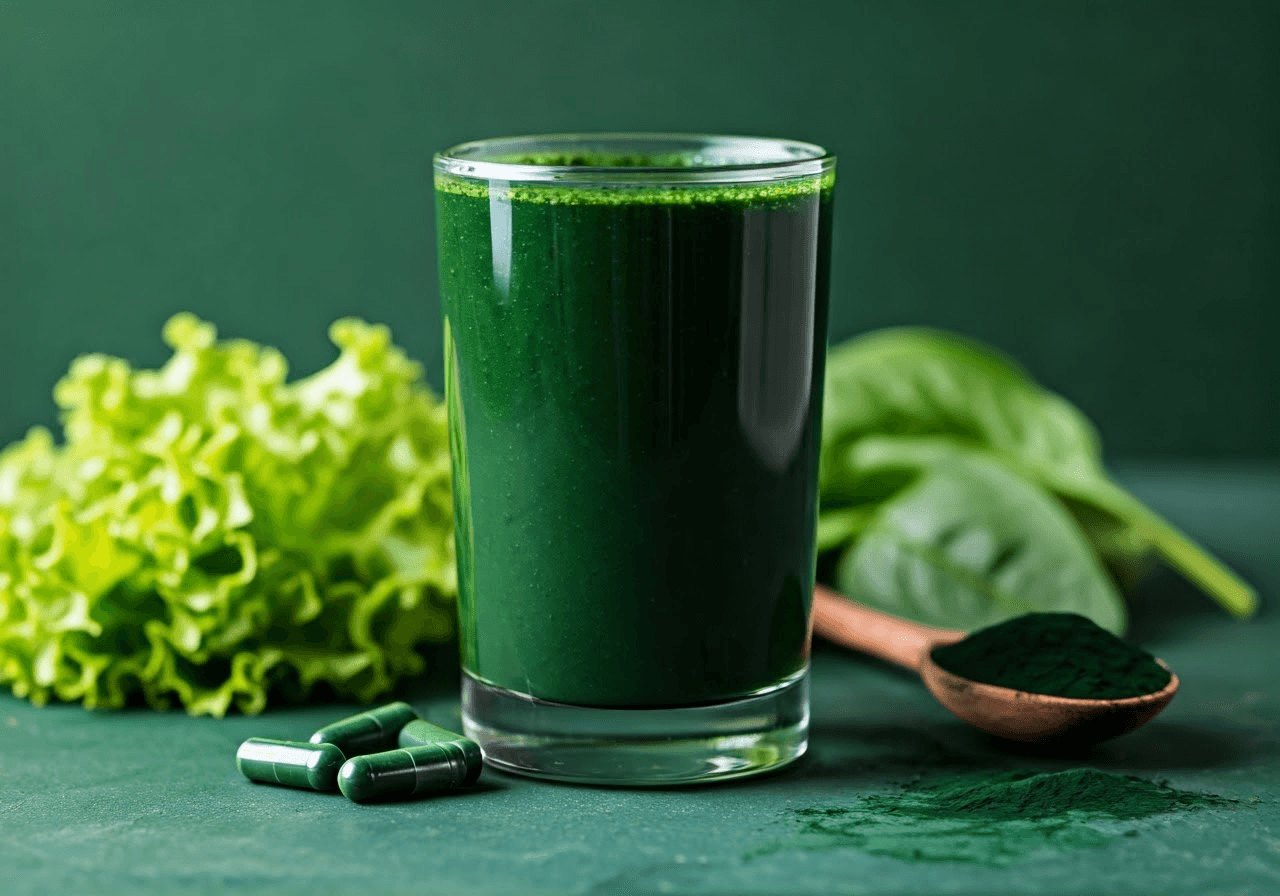
Thinking about adding this superfood to your routine? It’s easy to include spirulina in your diet. You can put it in smoothies, sprinkle it on salads, or take it in capsules. There is a way for you to enjoy this healthy algae that fits into your life.
Make sure to get your spirulina from trusted brands. This will help you ensure it is good quality and pure. Begin with a small dose. You can slowly increase it if your body allows it. Keep an eye out for any reactions.
Creative Spirulina Recipes: Smoothies, Salads & Snacks
Spirulina, known for its bright green color and slightly earthy taste, can easily be added to many meals without being too strong. Here are some fun ways to increase the nutritional value of your meals with spirulina:
Smoothie Power-Up: Blend a teaspoon of spirulina powder into your favorite smoothie recipe. This adds a green boost of nutrients and antioxidants.
Salad Sensations: Sprinkle a tablespoon of spirulina powder on your salad for an extra nutritional kick. It goes well with fresh greens, crunchy veggies, and a light vinaigrette.
Energy Bites: Mix spirulina powder into your energy bite recipes. This gives you more nutrients, protein, and a vibrant green color.
Guacamole with a Twist: Put a teaspoon or two of spirulina powder into your guacamole recipe. This adds nutrients and colors to a classic dip.
Make sure to pick organic spirulina from trusted brands to get high quality and purity.
Spirulina Dosage Guide: How Much to Take Daily & When
There is no official daily value for spirulina. Most advice suggests you start with a low dose of 1-2 grams each day. You can slowly raise it to 3-5 grams daily based on how your body reacts and what health benefits you want. It’s a good idea to talk to your healthcare provider to figure out the right amount for your needs.
You can take spirulina at any time during the day. Some people prefer taking it in the morning on an empty stomach. Others like to mix it into their meals or snacks. Try different times to see what feels best for you.
Being regular is important when taking any supplement. Make sure to use spirulina often to get its potential health benefits. Listen to your body and change the dose or timing if needed.
Latest Spirulina Research: Clinical Trials & Scientific Evidence
The study of nutrition is always changing. New research keeps helping us learn more about spirulina and what it can do. Ongoing studies look closely at how spirulina impacts our health and how well it works for different health problems.
Research shows that spirulina may help with long-term diseases and could even help people live longer. The newest findings about spirulina suggest an exciting future for it in keeping us healthy.
Recent Spirulina Studies: Health Benefits & Effectiveness
As spirulina becomes more popular, researchers are working hard to confirm its health benefits through careful studies. Systematic reviews look at data from many studies to give us insights about how effective spirulina is.
Clinical trials are very important because they help show clear proof of what spirulina can do for our health. Many clinical trials are happening now. These trials are looking at how spirulina might help with problems like high cholesterol, blood pressure, athletic performance, and even brain function.
While we wait for these results, it is important to think about spirulina carefully. We should recognize its possible benefits but also understand that more research is needed to prove its long-term effectiveness and safety.
Spirulina for Chronic Diseases: Heart, Diabetes & More
The rise of chronic diseases like heart disease, type 2 diabetes, and some cancers has led to a search for ways to prevent them. Spirulina stands out because of its rich nutrients and strong antioxidant properties. It might help in fighting these health issues.
Early studies show that spirulina can fight oxidative stress, lower inflammation, and may improve blood sugar and cholesterol levels. This suggests it could help prevent and manage chronic diseases. Still, more research is needed, especially larger human trials, to confirm how well spirulina works and how much is needed for specific health problems.
Even with the need for more studies, spirulina’s potential to support health and well-being is exciting. Its possible role in preventing chronic diseases makes it an interesting topic for future research and treatments.
Conclusion
Spirulina is a green superfood that brings many health benefits. It can help boost immunity, support weight management, and improve fitness. It is also good for heart health and may help in managing blood sugar levels. Adding spirulina to your diet is a great idea.
While it’s mostly safe, it’s important to know the side effects and who should stay away from it. Keep up with new research on spirulina. You can find fun ways to include it in your meals. Whether you want to improve your overall health or reach specific goals, spirulina can be a helpful part of your daily routine.
Remember to talk to a healthcare professional before you make big changes to your diet or health routine.
The content on WellwayHub.com is intended for general informational purposes only and should not be taken as medical advice. Please consult your doctor or a qualified health professional before making any changes to your health routine.
Some links on WellwayHub.com may be affiliate links. This means we may earn a small commission if you make a purchase through these links, at no extra cost to you. This helps support our mission to provide trusted wellness content.
Frequently Asked Questions
Spirulina is a nutrient-dense blue-green algae that supports immune health, detoxification, energy production, and inflammation control.
Spirulina offers many vitamins and minerals, but it may not fully replace multivitamins, especially for nutrients like B12 and vitamin D.
Yes, spirulina is known for being a strong source of protein. It has all nine essential amino acids. This great nutritional value makes it a favored choice for vegetarians and vegans who want to add more protein to their diet.
You may feel increased energy or reduced cravings in 1–2 weeks. Other benefits like skin health or cholesterol changes may take 4–8 weeks.
Spirulina’s antioxidants and anti-inflammatory compounds may support brain function, mood balance, and cognitive clarity.
Yes, spirulina may promote satiety, reduce cravings, and support metabolism thanks to its protein and nutrient content.
Not always. Pregnant or breastfeeding women and children should consult a healthcare provider before using spirulina.
People with certain health issues, like autoimmune diseases, should stay away from spirulina. Also, those who take specific medicines should talk to their doctor. They need to check for the risks of spirulina and any possible interactions with their medications.
Yes, it may interact with blood thinners, immunosuppressants, or diabetes medications. Always check with your doctor first.
There isn’t a single best time to take spirulina. You should try taking it at different times to see what works best for you. Some people like to take it in the morning. Others find it helpful to add it to their meals.
Powder is great for smoothies and recipes; tablets are convenient for daily use and travel. Choose what fits your routine.